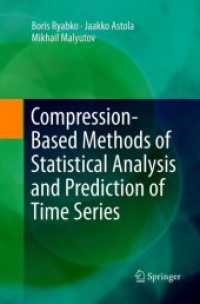- ホーム
- > 洋書
- > ドイツ書
- > Social Sciences, Jurisprudence & Economy
- > Environment, Agriculture, Forestry
- > Agriculture & Gardening
Description
Global human population is increasing rapidly, and it has been estimated to reached 9.7 billion by year 2050. With this massive population growth, the greatest challenge is sustainable food production. The traditional agriculture system does not have capacity to meet growing food demand therefore, it is emergent to introduce emerging technologies helping farming community to precisely utilize the resources to ensure food security under climate change conditions. The technological revolution of 21st century has transformed every sector of life with no exception to agriculture. The application of recent technical concepts i.e., Internet of things, cloud computing, big data, data mining and artificial intelligence had helped farming community to make smart decisions and actions for resolving complex problems of agriculture. Precision agriculture involves the utilization of sensors, drones, and satellite imagery for monitoring for monitoring crop health, soil conditions and weather patterns therefore, integration of artificial intelligence and data science-based technologies can improve sustainability, productivity, and climate resilience. The utilization of data sciences in precision agriculture represents a radical turn toward knowledge-based decision making. The application of data science concepts can help farming community to optimize the resource allocation, real time crops monitoring, efficiently and timely harvesting and yield prediction. This synergy will not only enhance the productivity but can also promote sustainable agricultural practices.
The book covers the latest developments taking place on application of data sciences for precision agriculture. It specifically focuses on the technological innovations for improving decision making, and cover various fields of data sciences and their application in agriculture production system.
Artificial Intelligence for Global Food Security.- Data Science for Precision Agriculture.- Pest and disease management through precision approaches.- The Role of GIS and GPS in Modern Agricultural Practices.- Introduction of Machine Learning and Enhancement of Agricultural Productivity in Agriculture.- Capacity Building and Education for Climate-Smart Agriculture.- Integrating Artificial Intelligence for Plant Phenotyping.- Smart Farming trends innovation and challenges.- Precision Agriculture in the Era of Technological Advancement.- Impact of Climate Change on Plant Pathogens Disease and Food Security.- Smart Farming Trends Innovation and Challenges.- Machine Learning Applications in Modern Agriculture Advancing Precision Farming Through Intelligent Systems.- Irrigation Management Through Smart Water Solutions.- The Potential of Remote Sensing in Modern Agriculture.- Regulatory Considerations for Utilizing Data Science in Precision Agriculture.
Dr. Sajid Fiaz, PhD, is Assistant Professor at the Institute of Molecular Biology and Biotechnology, University of Lahore. His research focuses on rice improvement using genome editing, marker-assisted selection, and multi-omics. He has 175 publications, 13 book chapters, edited nine books, and ranks among the world s top 2% scientists.
Dr. Muhammad Azhar Nadeem, Associate Professor of Plant Biotechnology at Mersin University, Türkiye, specializes in plant genomics, next-generation sequencing, and molecular marker development for crop improvement. He has 90+ SCI papers, 10+ book chapters, five edited books, and ranks among the World s Top 2% Scientists (2023 2025).
Prof. Faheem Shehzad Baloch, Professor of Plant Genetics and Genomics at Mersin University, Türkiye, specializes in plant phenomics, genetics, and biotechnology for crop improvement. He has 185+ Web of Science publications, 13 edited books, 14 chapters, 6,000+ citations (h-index 40), and serves on several high-impact journal editorial boards.
Dr. Yong Suk Chung, Associate Professor at Jeju National University, focuses on plant breeding and genetics integrating phenomics, AI, and machine learning for precision agriculture. He serves as an Evaluator for the European Innovation Council, a member of IPPN and COST Action DIVERSICROP, and CEO of Pytomix Corporation, advancing smart farming technologies.








